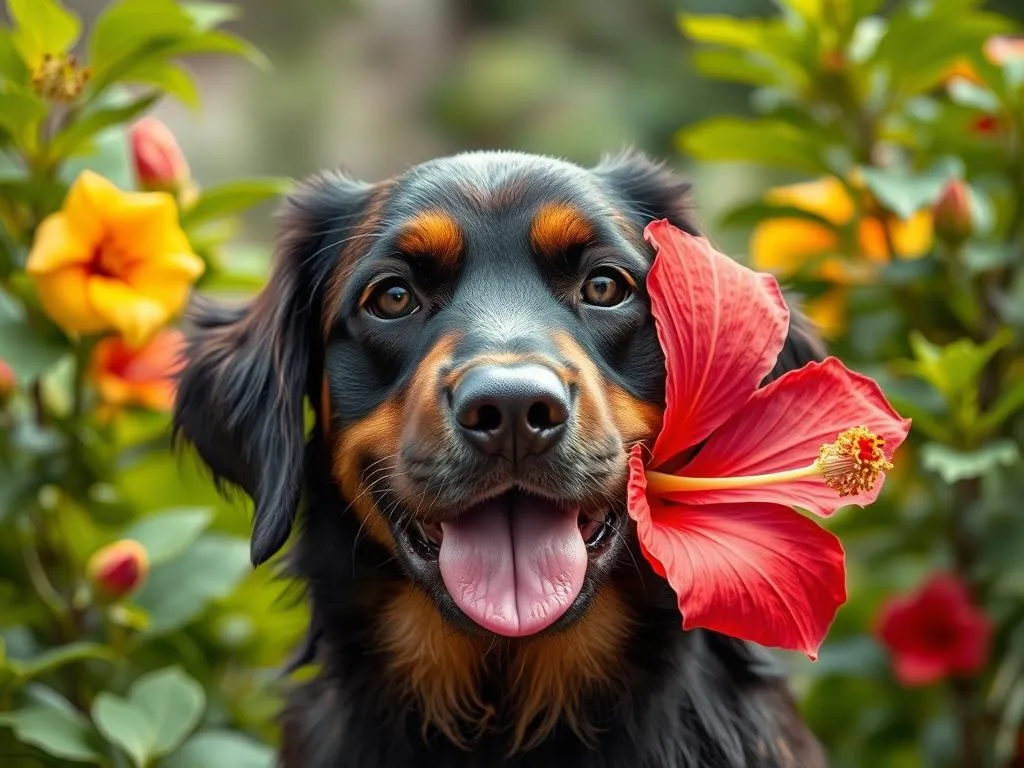
Understanding dog nutrition is crucial for every pet owner who wants to ensure their furry friend lives a long, healthy life. Just as humans need a balanced diet to thrive, dogs require specific nutrients to support their growth, energy levels, and overall well-being. As pet owners, it’s our responsibility to provide our dogs with the right foods while being cautious about what might be harmful.
One question that often arises among dog owners is, can dogs eat hibiscus? This article will explore the nutritional implications of hibiscus consumption for dogs, discussing its safety, potential benefits, and risks.
Understanding Dog Nutrition
Basic Nutritional Needs
Dogs are omnivores, which means they can thrive on a variety of foods. However, their diet should primarily consist of:
- Proteins: Essential for growth, repair, and maintenance of body tissues.
- Carbohydrates: Provide energy and aid in digestion.
- Fats: Important for energy, skin health, and absorption of fat-soluble vitamins.
In addition to these macronutrients, dogs also require various essential vitamins and minerals, such as:
- Vitamin A for vision and immune function
- Vitamin D for calcium balance
- B vitamins for energy metabolism
- Calcium and phosphorus for bone health
Hydration is another critical component of dog nutrition. Fresh, clean water should always be available to help maintain health and energy.
Common Nutritional Myths
There are numerous myths surrounding dog nutrition that can mislead owners. For instance, many believe that dogs should be fed a strictly meat-based diet or that grains are harmful. In reality, a balanced diet may include both animal and plant-based ingredients. Evidence-based information is essential for making informed decisions about your dog’s diet.
Introduction to Hibiscus
What is Hibiscus?
Hibiscus is a genus of flowering plants known for their large, colorful blooms. There are several varieties of hibiscus, including the popular Hibiscus sabdariffa, often used in herbal teas. Hibiscus is rich in antioxidants, vitamins, and minerals, making it a beneficial addition to human diets.
Common Uses of Hibiscus
In addition to being a beautiful ornamental plant, hibiscus has various culinary and medicinal uses:
- Culinary Uses: Hibiscus petals can be used in salads, jams, and beverages. They are often dried and steeped to make refreshing herbal teas.
- Traditional Medicinal Uses: Hibiscus has been used in various cultures for its health benefits, including lowering blood pressure, improving digestion, and providing anti-inflammatory effects.
- Popularity in Herbal Teas: Hibiscus tea is known for its tart flavor and vibrant red color, making it a favorite among tea drinkers.
Can Dogs Eat Hibiscus?
Safety of Hibiscus for Dogs
When considering whether dogs can eat hibiscus, it’s important to understand the safety of this plant. While hibiscus is non-toxic to dogs, some species may cause gastrointestinal upset if ingested in large quantities. Always consult with a veterinarian before introducing new foods to your dog’s diet.
Potential Benefits of Hibiscus for Dogs
Hibiscus is known for its antioxidant properties, which can be beneficial for dogs in several ways:
- Anti-inflammatory Effects: The antioxidants in hibiscus may help reduce inflammation, potentially benefiting dogs with arthritis or joint issues.
- Digestive Health: Hibiscus can support healthy digestion, which is crucial for overall health.
While these potential benefits are appealing, they should be approached with caution, as not all dogs may respond positively to hibiscus.
Risks and Side Effects
Although hibiscus is generally safe for dogs, there are some risks to consider:
- Gastrointestinal Upset: Some dogs may experience vomiting or diarrhea after consuming hibiscus, particularly if they eat a large amount.
- Allergic Reactions: Although rare, some dogs may be allergic to hibiscus, leading to symptoms such as itching, swelling, or difficulty breathing.
If a dog consumes hibiscus and exhibits any adverse reactions, it’s essential to contact a veterinarian immediately. Symptoms of hibiscus toxicity might include lethargy, vomiting, or diarrhea.
How to Safely Introduce New Foods to Your Dog
Guidelines for Introducing New Foods
Introducing new foods to your dog’s diet should be done gradually and with caution. Here are some guidelines to follow:
- Start with Small Amounts: Begin by offering a small piece of hibiscus or hibiscus tea to see how your dog reacts.
- Monitor for Reactions: Keep an eye on your dog for any signs of allergies or digestive issues, such as vomiting or diarrhea.
- Consult Your Veterinarian: Always check with your vet before adding new foods to your dog’s diet, especially if your dog has existing health issues.
Alternatives to Hibiscus
If you’re looking for safe floral options for your dog, consider these alternatives:
- Calendula: Known for its anti-inflammatory properties, calendula is safe for dogs and can be added to their diet in small amounts.
- Chamomile: Often used to soothe stomach issues, chamomile can be beneficial for dogs.
- Rose Petals: Safe for dogs, rose petals can add flavor and nutrition when given in moderation.
Additionally, consider nutritional supplements or treats that support dog health, such as omega-3 fatty acids for skin and coat health or probiotics for digestive support.
Conclusion
In summary, while dogs can eat hibiscus, it’s essential to approach this potential addition to their diet with caution. Understanding dog nutrition and the specific implications of introducing new foods is crucial for every pet owner. Hibiscus may offer some benefits, but it also comes with risks that should not be overlooked.
When in doubt, always consult with a veterinarian to ensure that your dog is receiving a balanced diet tailored to their specific needs. Prioritizing proper nutrition will help your dog lead a happy, healthy life.
FAQs
Can all dogs eat hibiscus?
Not all dogs may react the same way to hibiscus. While it’s generally safe, some dogs may experience gastrointestinal upset. Always consult with your veterinarian before introducing new foods.
What should I do if my dog eats hibiscus?
If your dog consumes hibiscus and shows any symptoms like vomiting or diarrhea, contact your veterinarian immediately for guidance.
Are there any other plants dogs should avoid?
Yes, there are several plants that can be toxic to dogs, including azaleas, lilies, and certain varieties of mushrooms. Always research any new plants before introducing them to your dog.
How can I ensure my dog is getting a balanced diet?
Consult with your veterinarian to create a balanced diet plan based on your dog’s age, size, activity level, and health needs. Regular veterinary check-ups can also help monitor your dog’s nutritional status.
References
- Veterinary studies on dog nutrition
- Experts in canine dietary needs
- Research on the effects of hibiscus in dogs and other animals









